ANNUAL REPORT 2021
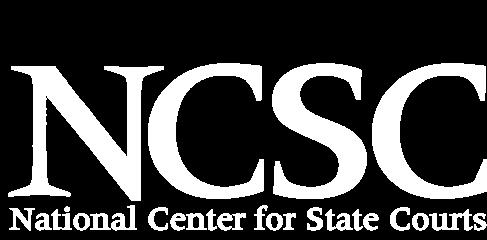


CHAIR
PAUL A. SUTTELL Chief Justice Supreme Court of Rhode Island Providence, RI
VICE-CHAIR
JEFF SHORBA State Court Administrator Minnesota Judicial Branch St. Paul, MN
CHAIR-ELECT
LORETTA H. RUSH Chief Justice Indiana Supreme Court Indianapolis, IN
VICE CHAIR-ELECT
KARL R. HADE Executive Secretary Supreme Court of Virginia Richmond, VA
PRESIDENT
MARY CAMPBELL MCQUEEN President National Center for State Courts Williamsburg, VA
JENNIFER D. BAILEY Circuit Court Judge 11th Judicial Circuit Miami, FL
BARRY P. BARBASH, ESQ. Willkie Farr & Gallagher Washington, DC
TRACY “T.J.” BEMENT District Court Administrator 10th Judicial Administrative District Athens, GA
ANNA BLACKBURNE-RIGSBY Chief Judge Court of Appeals Washington, DC
REGINALD J. BROWN, ESQ. Kirkland & Ellis, LLP Washington, DC
RUSSELL R. BROWN, III Court Administrator Cleveland Municipal Court Cleveland, OH
RANDALL M. EBNER Vice President & General Counsel (Retired) ExxonMobil Corporation Dallas, TX
JIMMIE M. EDWARDS
Lashly & Baer, P.C. St. Louis, MO
LAURIE K. GIVENS
Administrative Director Administrative Office of the Courts Frankfort, KY
MICHAEL J. HARRINGTON
Sr. Vice President & General Counsel (Retired) Eli Lilly and Company Carmel, IN
NATHAN L. HECHT Chief Justice Supreme Court of Texas Austin, TX
MICHAEL H. LANZA
Executive Vice President & General Counsel Selective Insurance Group Branchville, NJ
MICHAEL P. MAGUIRE, ESQ. Michael Maguire & Associates Trabuco Canyon, CA
MELANIE G. MAY Appellate Judge Fourth District Court of Appeal West Palm Beach, FL
DAN MOZENA
U.S. Ambassador (Retired) U.S. Department of State Silver Spring, MD
ELIZABETH N. MULVEY Crowe & Mulvey Boston, MA
JOHN T. NOCKLEBY Professor of Law
Susan Gurley Daniels Chair in Civil Advocacy Director, Civil Justice Program & Journalist Law School at Loyola Law School Los Angeles, CA
KATHLEEN FLYNN PETERSON, ESQ. Ciresi Conlin, LLP Minneapolis, MN
THOMAS W. ROSS President Volcker Alliance, Inc. New York, NY
LORETTA H. RUSH Chief Justice Indiana Supreme Court Indianapolis, IN
GREG SATTIZAHN State Court Administrator Unified Judicial System Pierre, SD
TOKO SERITA Judge Queens Criminal Court Kew Gardens, NY
ERICA R. YEW Judge, Superior Court Santa Clara County San Jose, CA
Table of Contents Honoring the Past 4 NCSC Timeline: 50 years Leading the Present 6 Pandemic Response 8 Eviction Diversion 10 Racial Justice 12 Guardianship & Conservatorship 14 Mental Health 16 Award Recipients Inspiring the Future 18 Just Horizons 20 International Strategic Plan 22 Warren E. Burger Society 24 General Counsel Committee 26 Lawyers Committee 27 Young Lawyers Committee 28 2021 Honor Roll of Contributors 28 Joan K. Cochet Memorial Scholarship 29 Tribute Gifts 30 Friends of the Court 31 Presidents Legacy Society
Board of Directors 2021-2022 — Effective August 2021
The National Center for State Courts promotes the rule of law and improves the administration of justice in state courts and courts around the world.
MISSION STATEMENT
President & Chair Message
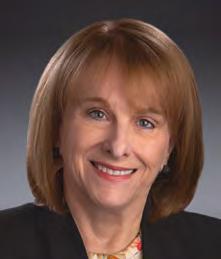
How did Williamsburg, Virginia, become an important resource for court improvement? It began with a speech.
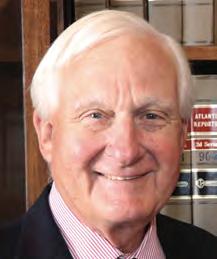
At the First National Conference of the Judiciary in March 1971 in Williamsburg, Chief Justice of the United States Warren Burger called for the creation of “a national center for state courts.” This organization would serve as a “central resource” to improve the operations of the state courts, much as the Federal Judicial Center (FJC) did for the federal courts. This brought up two key questions:
1. What form should this “central resource” take?
2. Where would it be located?
The staff of the new National Center for State Courts (NCSC) still had to deal with those questions as they took up residence in a temporary headquarters in Washington, D.C., bunking with their peers from the FJC while the search for a permanent headquarters got underway.
NCSC had started a 50-year trek across the United States — and eventually into other countries. NCSC traveled beyond just gathering data and definitions and delved into education, technology, leadership, and other areas to improve court operations, reinforce the rule of law, and enhance public trust in the justice system. And a permanent headquarters was ultimately established in Williamsburg in 1978.
But NCSC would not have advanced on that journey without the support of state court leadership, at all levels. Therefore, it was fitting that the Conference of Chief Justices (CCJ) and the Conference of State Court Administrators (COSCA) helped dedicate a new “Legacy Circle” at NCSC headquarters in 2021. A procession of the chief justices — traveling from the Williamsburg Lodge up the hill to NCSC with sounds from the Colonial Williamsburg Fife and Drum Corps in the air — was more than just pageantry. It was symbolic of the 50-year journey NCSC has taken in support of our mission to improve the administration of justice and promote the rule of law.
The Annual Report does more than simply commemorate 50 years of NCSC. It also highlights the unique challenges faced by the courts in 2021 and offers a glimpse into the future. The journey to improve our nation’s state courts continues. And we march on.
3 ANNUAL REPORT
Paul A. Suttell Chief Justice Supreme Court of Rhode Island
Mary Campbell McQueen President National Center for State Courts
1973
1971
NCSC is founded at the First National Conference of the Judiciary in Williamsburg, Virginia.
NCSC is incorporated in Washington, D.C.
Justice Winslow Christian, on leave from the California Court of Appeals, becomes NCSC’s executive director, serving until 1973.
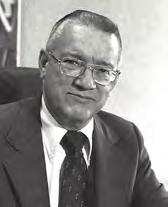
1973
Edward B. McConnell, former New Jersey state court administrator, becomes NCSC’s executive director (renamed “president” in 1983) and serves for 17 years.
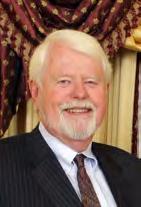
1974
NCSC compiles and publishes the first Survey of Judicial Salaries 1976
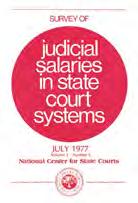
After commencing operations in Washington, D.C., and relocating to Denver, Colorado, ground is broken for NCSC headquarters in Williamsburg, Virginia 1982
NCSC acquires the Center for Jury Studies 1984
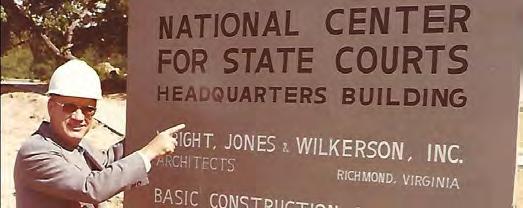
Institute for Court Management (ICM) merges with NCSC.
1987
NCSC publishes the original Trial Court Performance Standards 1988
NCSC publishes the first of the “Report on Trends in State Courts” series. 1990
Larry Sipes (former head of NCSC’s Western Regional Office) becomes NCSC president. 1991
NCSC establishes International Division.

4 NATIONAL CENTER FOR STATE COURTS HONORING THE PAST
19741976 1990
On July 25, 2021, state court leadership and other honored guests commemorated the 50th anniversary of the founding of the National Center for State Courts in Williamsburg, Virginia, by dedicating the Legacy Circle, which features commemorative pavers that recognize each state’s court system and supporters.
Texas Supreme Court Chief Justice Nathan Hecht, president of the Conference of Chief Justices and chair of NCSC’s Board of Directors, spoke of NCSC’s wide-reaching accomplishments, including crisis response, that helped state courts stay afloat.
U.S. Congresswoman Elaine Luria presented an American flag that was flown at the U.S. Capitol and spoke of NCSC’s impact on both the state and nation in improving the administration of justice. Virginia Supreme Court Chief Justice Donald W. Lemons delivered an official recognition on behalf of Virginia Governor Ralph Northam. And NCSC President Mary C. McQueen celebrated the center’s accomplishments while looking ahead to how it will shape the court system’s future.
1996
Roger K. Warren (former trial judge, Sacramento Superior Court) becomes NCSC president.
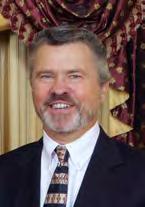
1999
NCSC hosts National Conference on Public Trust and Confidence in the Justice System.
2004
Mary Campbell McQueen (former state court administrator of Washington) becomes NCSC president.

2008
Harvard Executive Sessions for State Court Leaders in the 21st Century begin.
2014
First State of the State Courts public opinion survey is conducted.
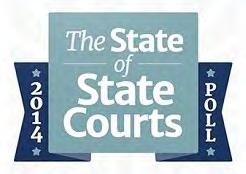
2016
Civil Justice Initiative issues final report.
2020
Rapid Response Team provides guidance to courts during COVID-19 pandemic.
2021
NCSC, the Conference of Chief Justices and the Conference of State Court Administrators establish the Rapid Response Team (RRT) Implementation Lab to evaluate and share innovations in court operations in response to the COVID pandemic.
NCSC marks its 50th anniversary at the annual meeting of the Conference of Chief Justices and the Conference of State Court Administrators in Williamsburg.
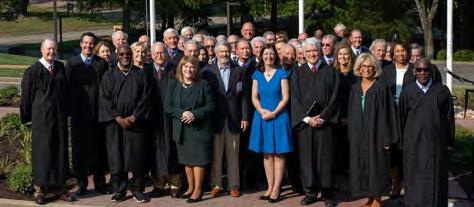
NCSC launches the Eviction Diversion Initiative to assist courts in dealing with high-volume, highimpact eviction dockets.

5 ANNUAL REPORT
1996 2004 2014 2021
Responding to the Pandemic’s ‘New Normal’

Leading up to the 2020 presidential election, Circuit Judge Jennifer Bailey recalls following news on U.S. Postal Service issues affecting the delivery of mail-in ballots. But she didn’t think about how these issues impacted the delivery of court notices until she watched an NCSC Tiny Chat video.
“This just hadn’t occurred to me,” said Judge Bailey, the administrative judge of the Civil Division of the 11th Judicial Circuit Court of Florida in Miami. “After I watched the Tiny Chat, I shared it with the court community in Miami — not just my court — and it hadn’t occurred to anyone else either. This allowed us to prepare so we could counteract whatever disruption might occur.”

Highlighting the impact of U.S. mail delays on the courts is one of many examples of how NCSC and the Pandemic Rapid Response Team (RRT) provided “crucial information to court leaders as it was needed” in 2021, according to Judge Bailey.
“The RRT has been able to research and deliver immediate solutions to the problems we were facing,” she added. “The simplicity of the solutions — Tiny Chats, webinars, newsletter articles — has been remarkable.”
Judge Bailey, a judge since 2002, said the pandemic has challenged the courts in a myriad of ways, but the challenges can be distilled into two areas: “Anything you were doing in person and anything you were doing on paper.”
She said one of the most impactful lessons learned from dealing with the pandemic is how courts used Zoom and other video technology platforms to transition from inperson hearings to remote hearings.
Learn more about NCSC’s pandemic response ncsc.org/pandemic
“Before the pandemic, there was a huge resistance to remote appearances,” she said. “I would tell my colleagues, ‘You have to allow attorneys to appear remotely,’ but many of them didn’t want to. Now we have 143 judges working on the Zoom platform, and what we’ve found is that the judges who expressed the most resistance pre-pandemic are the biggest converts (to
6 NATIONAL CENTER FOR STATE COURTS
LEADING THE PRESENT
Pandemic Rapid Response Team comes through for courts again
remote hearings) right now.”
She said judges now see how allowing court users to appear remotely boosts court appearance rates and does so in a cost- and time-effective way. They don’t have to take a day off from work and pay for childcare and parking. And lawyers have embraced it as well.
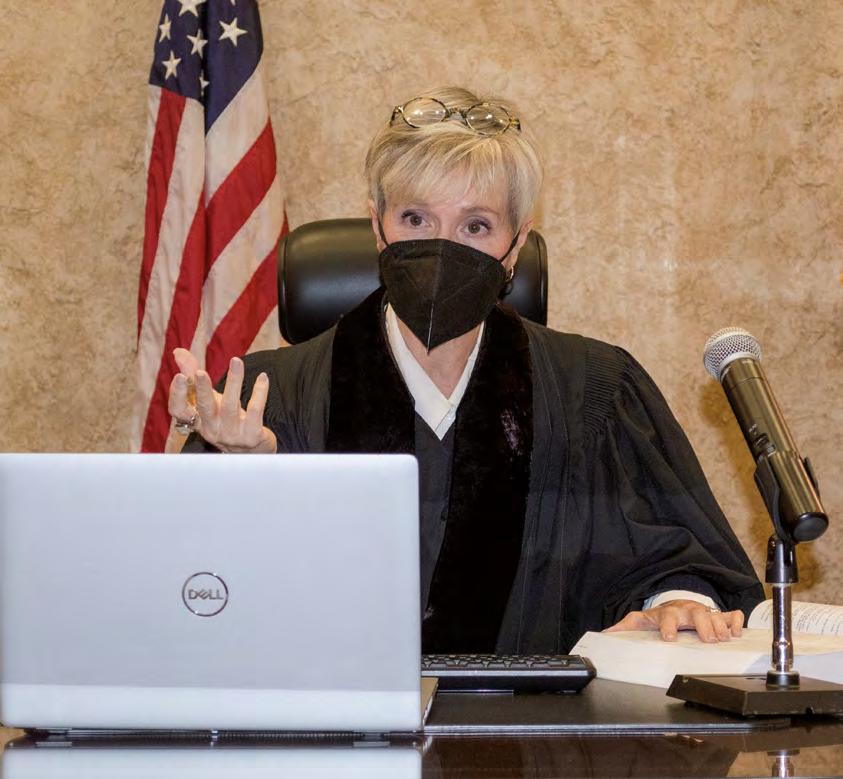
“Attorneys can be in court in Miami at 9, in Fort Lauderdale at 9:15 and in Palm Beach at 9:30,” Judge Bailey said. “It makes a huge difference in scaling the practice of law, and our judges see that now. Pivoting to remote hearings allowed us to see barriers that were invisible to us. This showed we can change, and we can innovate.”
“I’m so proud of what the RRT did to get us there and allow for the transformation of courts into a more user friendly and justice focused institution since the pandemic began,” she said.
SPOTLIGHT:
One of the highlights of the Pandemic Rapid Response Team’s 2021 work is the development of a tool to help courts identify, measure and reduce case backlogs.
The Court Backlog Reduction Simulator will help courts identify trouble spots and provide a starting point for troubleshooting, which may range from additional bench time to hearing notice reminders, depending on where backlogs are occurring.
Backlogs were not uncommon before the coronavirus pandemic, but it has exacerbated them, especially in criminal courts, where it has become difficult to empanel juries with new safety protocols in place.
Funded by the State Justice Institute, the simulator is designed to help
all courts — criminal, civil, family and problem-solving — said Nora Sydow, the NCSC principal court management consultant who is overseeing the tool’s development.
“We wanted to build a tool that would help courts explore the potential benefits of different backlog reduction interventions,” Sydow said. “We also wanted to build a tool that would have strong data viz capabilities so courts could effectively share with court partners and funding bodies.”
During the fall, NCSC staff piloted the tool with several jurisdictions and received feedback during the Court Technology Conference. Additional research and development are underway with an official launch scheduled for 2022.
7 ANNUAL REPORT
Tool helps courts address backlogs
NEWSLETTER ARTICLES
“THE RRT HAS BEEN ABLE TO RESEARCH AND DELIVER IMMEDIATE SOLUTIONS TO THE PROBLEMS WE WERE FACING... THE SIMPLICITY OF THE SOLUTIONS — TINY CHATS, WEBINARS,
— HAS BEEN REMARKABLE.”
— CIRCUIT JUDGE JENNIFER BAILEY
11th
Judicial Circuit Court of Florida
Photo Courtesy of the 11th Judicial Circuit Court of Florida
Supporting Court Reforms
NCSC consultants Danielle Hirsch and Zach Zarnow have been thinking for years about how to help courts manage their high-volume dockets, and none are more high volume than eviction dockets. So when the pandemic triggered eviction moratoria, they noticed that Philadelphia and Chicago unveiled eviction diversion programs. Hirsch and Zarnow sprang into action.
“We knew courts would need direction,” Zarnow said. “They’d be looking for resources. They’d be looking for information. They’d be looking for model programs and rules.”

Hirsch and Zarnow already had the idea of providing courts with an eviction diversion toolkit, but they realized that whatever they created needed to be interactive and customizable — “something equivalent,” he said, “to someone from a court calling us and asking us questions and being able to give them answers.”

Around the same time, they were approached by officials from federal agencies, including the Department of Justice, the White House, Housing and Urban Development and the Treasury Department, all of whom wanted to avert a housing crisis after the moratoria ended. Feeling the urgency, Hirsch and Zarnow launched an online Eviction Diversion Diagnostic Tool in a couple of weeks.
To date, the tool has been used more than 2,300 times, and at least a dozen courts have eviction diversion programs because of it.
“The tool has been really powerful,” Zarnow said, “not just because it has been helping the courts but because it has been helping Legal Aid and all of the other stakeholders that are trying to make a difference in this area by giving them a framework for a conversation with their courts.”
“Collaboration, coupled with innovation, is the only way that state and local courts can engage to prevent an eviction crisis,” Hirsch added.
Learn more about NCSC’s eviction work at ncsc.org/eviction
The success of the tool helped pave the way for the Eviction Diversion Initiative, a new grant program that will allow about 10 courts to transform the way they handle eviction cases. The grants — about $10 million in all — will allow courts to hire staff to oversee eviction diversion efforts to benefit tenants
8 NATIONAL CENTER FOR STATE COURTS
LEADING THE PRESENT
Pandemic pushes eviction diversion efforts to center stage
as well as landlords. And as part of its effort to further expand its impact in eviction diversion, NCSC hired Samira Nazem, a former housing attorney in Chicago who worked on eviction diversion efforts there.
The tool and the grant program are just two of many resources that NCSC has provided for state courts and housing agencies in 2021. Other resources include webinars, Tiny Chat videos and white papers. NCSC also created resources that offer information about related topics such as general evictions, rental assistance and high-volume dockets.
Additionally, NCSC convened a virtual meeting between more than 40 state supreme court chief justices and U.S. Attorney General Merrick Garland and Associate Attorney General Vanita Gupta to discuss the housing and eviction crisis and its
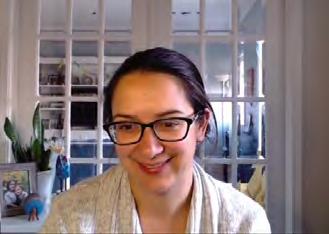
impact on state courts.
Supreme Court Chief Justice Nathan Hecht of Texas and Chief Judge Anna Blackburne-Rigsby of the District of Columbia Court of Appeals authored a guest essay on eviction reform that appeared in The New York Times
Some jurisdictions like the District of Columbia (see “Spotlight”) already had eviction diversion efforts underway before the pandemic. However, circumstances in 2021 prompted a deeper assessment of the courts’ approach to evictions.
“Our hope is that these eviction diversion efforts will benefit the longer-term effort to create a dialogue between federal agencies and the state courts,” Nazem said. “Not to say that dialogue hasn’t happened before, but these discussions have reinvigorated them.”
SPOTLIGHT: Evictions and DC Courts
DC Courts had components of eviction diversion in place prior to the pandemic. Concerns about long-term effects from the public health emergency coupled with fears of an avalanche of new eviction cases and a backlog of past due eviction cases were anticipated and served as the impetus for the court to closely examine its existing case management processes and develop a more holistic approach to:
Anna BlackburneRigsby
• Ensuring equal access to justice
• Increasing public trust and confidence
• Streamlining business processes
• Connecting people to resources
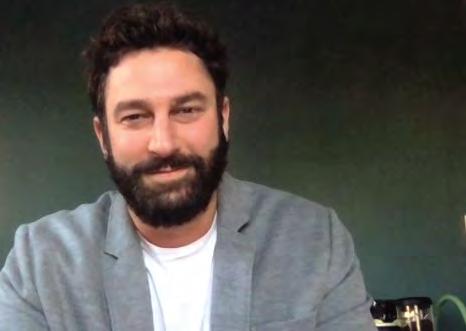
• Promoting case resolution, and
• Improving allocation of judicial resources
With these goals in mind, we have seen many improvements, including:
• Serving remote hearing notices electronically and mailing tip sheets on how to participate
• Translating forms and information to Spanish and Amharic
• Opening six sites across the city for remote participation by selfrepresented litigants, and
• Connecting tenants to financial and legal resources in all remote hearings.
It’s housing that plays such an instrumental part in all of our lives, to families and the security that affords us with greater opportunities and the ability to succeed. It’s about providing a fair shot to everyone.
Submitted by: Anna Blackburne-Rigsby, Chief Judge, District of Columbia Court of Appeals

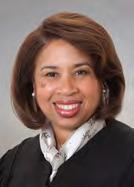
9 ANNUAL REPORT
“COLLABORATION, COUPLED WITH INNOVATION, IS THE ONLY WAY THAT STATE AND LOCAL COURTS CAN ENGAGE TO PREVENT AN EVICTION CRISIS.”
— DANIELLE HIRSCH
From top: Samira Nazem, Zach Zarnow and Danielle Hirsch are leading NCSC’s eviction diversion efforts.
Improving Racial Justice Throughout the U.S.
As recently as 2020, Kentucky used a simple system to notify juveniles about court-related appointments: Mail them a notice with the time, date and place. Many states have similar practices, but court leaders in Kentucky discovered that children of color had higher failureto-appear rates than white children, so Kentucky made changes. The courts began contacting parents and guardians to coordinate convenient appointment times and locations, and appearance rates for children of color increased by 14 percent statewide.
Kentucky’s court leaders were not blind to how their policies and procedures affected people of color before. But their focus on racial justice intensified in 2020. That was the year when Breonna Taylor was killed by Louisville police. Two months later, the world witnessed video of George Floyd’s murder during an encounter with Minneapolis police.
Kentucky Supreme Court Chief Justice John Minton responded to the incident by acknowledging that systemic racism exists in Kentucky’s state courts and urging court leaders to address it.
“That changed the conversation for our court system,” said Laurie Givens, the state’s top court administrator.
Givens, past president of the Conference of State Court Administrators, serves on the steering committee for NCSC’s Blueprint for Racial Justice, a national effort of more than 150 individuals who are working toward ensuring equality under the law is a reality for all.
“The Blueprint for Racial Justice is changing the conversation for courts across the country,” Givens said. “We recognize that every state is in a different place when approaching issues of racial justice and diversity, and we want to meet you where you are in the process and give you tools to advance your efforts.”

The project encourages conversation and collaboration among court leaders with a focus on systemic change; increasing the diversity of the bench, bar and workforce; fairness and awareness; and communication and implementation.
Givens and others are sharing their successes and challenges during ongoing
10 NATIONAL CENTER FOR STATE COURTS
Learn more about the Blueprint for Racial Justice ncsc.org/racialjusticeblueprint
LEADING THE PRESENT
State courts, NCSC examine the role of race in the administration of fair and equal justice
Blueprint for Racial Justice webinars and activities.
One way Kentucky has demonstrated its commitment to diversity is through the hiring of its first diversity and inclusion coordinator, Patrick Carrington. In this role, Carrington is charged with fostering a more inclusive environment and helping the court recruit diverse talent.
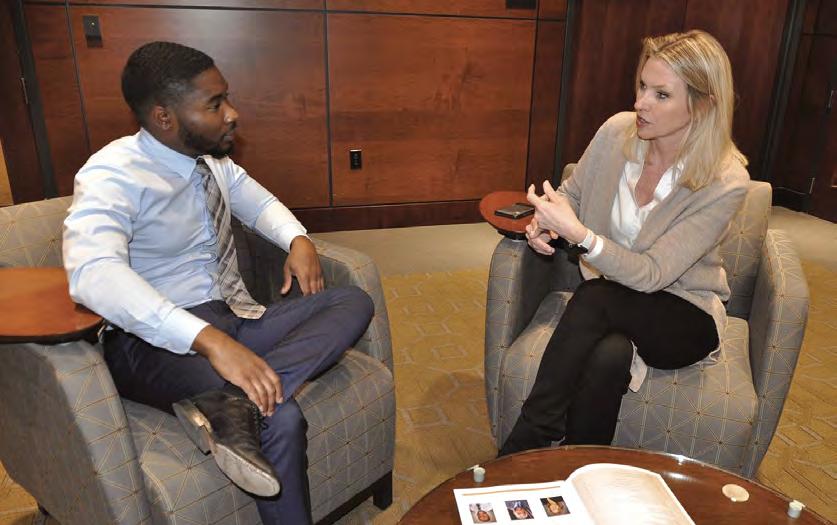
Other significant changes in Kentucky include:
• Developing A Guide for Identifying, Addressing and Reducing Racial and Ethnic Disparities, a roadmap for addressing the systemic racism identified by Chief Justice Minton.
• Training for close to 4,000 state court employees, elected judges and clerks to recognize implicit bias.
• Reviewing case data through an ethnic and racial lens to identify potential barriers.
• Examining recruitment and retention practices to increase diversity among court employees.
Prior to the 2020 George Floyd murder, Kentucky hired the University of Louisville’s Department of Justice Administration to identify the racial and ethnic disparities that affect how the courts fulfill its constitutional and statutory duties. The goal was to significantly improve outcomes for minorities by making changes.
“Our juvenile justice efforts were widely successful, depending on the color of your skin,” Givens said. “Our reform efforts were having outstanding outcomes for our white kids, but our kids of color were not enjoying the same success. We began digging further into the data, and the deeper we dug, the more upset we became about what was happening in our state.”
That triggered an examination into how well the state’s courts delivered justice to people of all colors and ethnicities. The examination led to policy changes, and the changes led to positive results.
“That was a launching point for us,” Givens said, “but we know racial justice work is never done.”
SPOTLIGHT:
Reducing racism in Massachusetts
Massachusetts, like Kentucky, began reckoning with its courts’ racial and ethnic disparities long before the world heard of George Floyd. But Floyd’s killing triggered considerable discussion and action.
“Before George Floyd, we often referred to racial disparities as bias,” said recently retired Massachusetts Trial Court Chief Justice Paula Carey. “Now we call it what it is — racism.”
Chief Justice Carey is one of the court leaders who has shared her state’s experiences during Blueprint for Racial Justice conversations and presentations. Following Floyd’s death, Massachusetts almost immediately started hosting Zoom meetings so court employees could discuss their feelings about the incident.
The courts released a report that acknowledged systemic racism, conducted listening sessions with employees and community members, and established the Trial Court Office of Workplace Rights & Compliance to work toward eliminating discrimination and harassment.
Massachusetts also made sure its hiring panels are diverse and equipped with detailed demographic information.
“Despite all of this,” she said, “we determined it wasn’t enough.”
In 2021, court leaders created the Committee to Eliminate Racism, made up of nine working groups on everything from education and training to juries and data collection. The work groups include everyone from judges and clerks to prosecutors and courthouse maintenance workers.
“We’re really excited about it,” she said of the committee. “The working groups are energized. This represents new momentum for us in Massachusetts.”
11 ANNUAL REPORT
Photo Courtesy of the Kentucky Administrative Office of the Courts
From left: Patrick Carrington discusses Kentucky’s diversity and inclusion initiatives with state court administrator Laurie Givens.
Protecting Vulnerable Populations

Like many, Diane Robinson followed the media circus that was the Britney Spears conservatorship case in 2021.
But unlike most fans and observers, Robinson followed the case from a different perspective. As the lead staff member for NCSC’s Center for Elders and the Courts, she was intrigued by how the controversy shone a bright light on guardianship and conservatorship cases.
“It brought conservatorships into the public eye in a way that I’ve never seen before,” she said. “It sparked a public discussion about what conservatorships and guardianships are and when they’re appropriate. That was positive, and her case raised awareness that guardianships and conservatorships can be ended.”

Robinson has been interested in protecting children and vulnerable adults for decades, having worked for several years in the Administrative Office of the Courts in Arkansas. She served in several capacities there including director of the Office of Research and Justice Statistics, coordinator of the Court Improvement Program, and state director of the Court Appointed Special Advocate program, which gives children a voice in court.
Guardianships should only be granted when less restrictive options are unavailable, Robinson said. If necessary, guardianships should be limited in scope and based on the person’s needs. Many times, guardianships are permanent and far-reaching. Not only did the Spears case create greater public awareness for this type of court intervention, it also prompted some courts to examine how they’re monitoring guardianship and conservatorship cases, though many were already doing so prior to 2021, according to Robinson.
DEFINITIONS
A guardianship is a relationship created by state law where a court gives one person or entity (the guardian) the duty and power to make personal and/or property decisions for another person. Guardianships are designed to protect the interest of incapacitated adults and elders and may refer to both the person and the estate. The term conservatorship is used when referring to matters of the property only, but not personal affairs.
12 NATIONAL CENTER FOR STATE COURTS
in guardianships, conservatorships Learn more about guardianships and conservatorships eldersandcourts.org/ guardianship_conservatorship LEADING THE PRESENT
NCSC responds to growing interest
NCSC’s work on guardianships/conservatorships in 2021 included:
• Testifying before a U.S. Senate subcommittee hearing titled, “Toxic Conservatorships: The Need to Reform.” (Read more: “Guardianships in Texas”)
• Working with three states through federal grants to reduce the number of new guardianship cases and more effectively monitor existing cases. In Maryland, officials want to reduce the number of unnecessary or overly broad guardianships and divert guardianship cases from the health-care-to-guardianship pipeline. Massachusetts is working to create an Office of Adult Guardianship and Conservatorship Oversight. An effort in Nevada is training guardians and judges on guardianship monitoring and will increase the use of data in decisionmaking to improve equity in the state’s guardianship process.
• Completing a survey from professionals in 46 states and the District of Columbia that shows effective, ongoing monitoring of guardianship and conservatorship cases continues to challenge state courts. Survey results revealed that guardianship monitoring varies greatly from state to state and court to court, there is a broad need for better data collection, and more funding is necessary for
guardianship monitoring. NCSC recommended that courts require future care plans, closely review annual accounting and well-being reports, make regular visits to individuals under guardianship, and conduct hearings to assess the continuing need for guardianships.
• Promoting the use of Guardianship/ Conservatorship Recommended Data Elements to help courts better understand guardianship-related data collection.
• Contributing to an article written about guardianship monitoring and actively participating in the 2021 National Guardianship Summit.
• Convening quarterly meetings with state guardianship subject matter experts to discuss issues such as managing witnesses during remote guardianship hearings and policy concerns.
• Working with the National Association for Court Management (NACM) to update its Adult Guardianship Guide to help courts plan, develop and sustain a comprehensive court guardianship and conservatorship program.
• Working with two pilot courts to implement real-time financial monitoring of conservatorships.
SPOTLIGHT:
Guardianships in Texas
In September, David Slayton, NCSC vice president for Court Consulting Services, testified before a U.S. Senate subcommittee reviewing guardianships and conservatorships. Slayton, who previously served as the state court administrator in Texas, said that a review of more than 55,000 cases revealed over 5,000 individuals had died without the guardian notifying the judge and 40% of guardianship cases lacked required reports sufficient to allow judges to oversee the well-being and estates of the persons under guardianship.
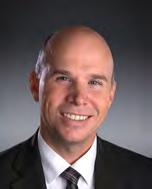
Texas has implemented a number of measures to improve guardianship oversight:
• Creation of a new alternative to guardianship called Supported Decision-Making.
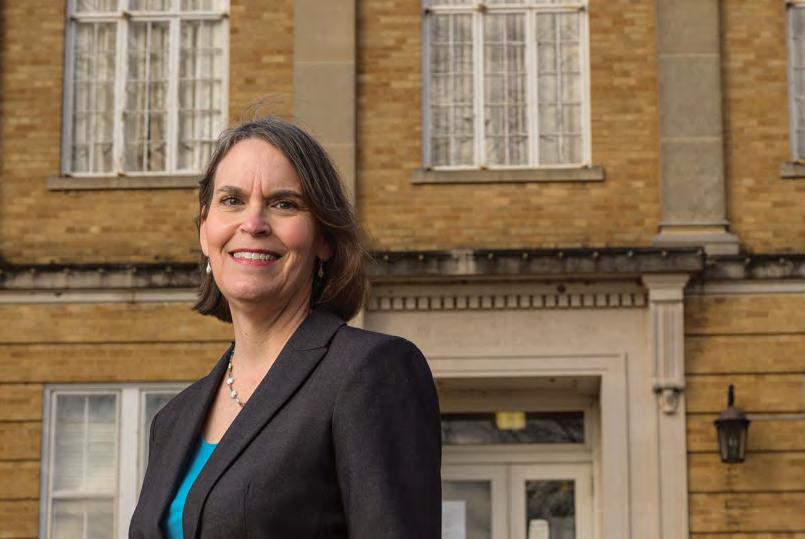
• Development of a guardianship bill of rights.
• Requirement for family members and friends to register as guardians, undergo a criminal background check and participate in online training.
• Appropriation of $2.5 million and 28 new employees to assist judges in monitoring and reviewing annual accountings to detect financial fraud and exploitation.
• Establishment of specialized guardianship courts.
• Increased access to records from financial institutions.
13 ANNUAL REPORT
Diane Robinson leads NCSC’s conservatorship and guardianship work.
David Slayton
Understanding Mental Illness and Court Involvement
In the fall of 2019, NCSC organized a mental health summit that made it clear there is a longtime crisis in the courts that must be addressed: Defendants who suffer from mental illness are languishing in jails while they wait for judges to determine if they are competent to stand trial. This problem exists nationwide, but the summit led the Illinois Supreme Court to do something big: Create the Illinois Mental Health Task Force.
A year later, Illinois presented its own summit, Improving the Court and Community Response to Persons with Mental Illness and Co-Occurring Disorders through Compassion and Hope, which drew more than 1,000 attendees.
Marcia Meis serves on the executive committee of the NCSC-staffed National Judicial Task Force to Examine State Courts’ Response to Mental Illness, also known as the Behavioral Health Task Force. As director of the Administrative Office of the Illinois Courts, she credits NCSC with shedding light on this crisis and for helping Illinois in its efforts to take action.
In Illinois, there is “a great deal of work to be done,” Meis said, “but we’ve made significant progress.”

Besides creating the Illinois Mental Health Task Force, the state hired its first behavioral health administrator to serve as the Illinois Judicial Branch’s mental health voice and resource. As the task force’s project director, the administrator focuses on furthering local, state, and national behavioral health and justice initiatives that affect the courts.
In addition, Illinois is creating a statewide vision for a comprehensive behavioral health continuum of care plan with stakeholder input from workshops, community assessments and other activities.
Learn more about the National Judicial Task Force to Examine State Courts’ Response to Mental Illness ncsc.org/behavioralhealth
“We continuously work toward the realization of that vision,” Meis said.

14 NATIONAL CENTER FOR STATE COURTS
LEADING THE PRESENT
NCSC works with states like Illinois to improve the courts’ response to the behavioral health crisis
With ongoing support from NCSC, the State Justice Institute and the Department of Justice, Illinois has made significant progress, including:
• Collaboration between law enforcement and mental health agencies.
• Future hiring of embedded clinical mental health professionals in local courts.
• Increased public awareness about the benefits of a therapeutic approach to justice.
• Planning for a state court action plan that outlines concrete recommendations for improvements.
Meis has high hopes for the national Behavioral Health Task Force and emphasized how critical it is for governments at all levels to work together. For real national change, she said the work must be continually promoted and publicized after the task force winds down its work later in 2022.

“Ongoing encouragement and commitment at the national level,” she said, “demonstrates to state and local leaders that improving the court and community response to individuals with mental illness is an ongoing priority and change is the expectation.”
Adults 18 or older received inpatient or outpatient mental health services or took prescription medication for a mental health issue in 2020.
Source: 2020 National Survey on Drug Use and Health, Substance Abuse and Mental Health Services Administration (SAMHSA)
15 ANNUAL REPORT
“ONGOING ENCOURAGEMENT AND COMMITMENT AT THE NATIONAL LEVEL DEMONSTRATES TO STATE AND LOCAL LEADERS THAT IMPROVING THE COURT AND COMMUNITY RESPONSE TO INDIVIDUALS WITH MENTAL ILLNESS IS AN ONGOING PRIORITY AND CHANGE IS THE EXPECTATION.”
— MARCIA MEIS
Director of the Administrative Office of the Illinois Courts, Executive Committee Member, National Judicial Task Force to Examine State Courts’ Response to Mental Illness
41.4
MILLION
Honoring Service
WILLIAM H. REHNQUIST AWARD
Judicial Excellence
Louisiana District Court Judge Scott U. Schlegel received NCSC’s 26th Annual William H. Rehnquist Award for Judicial Excellence in 2021. He is the first Louisiana judge to receive the award, which honors a state court judge who demonstrates the outstanding qualities of judicial excellence, including integrity, fairness, open-mindedness, knowledge of the law, professional ethics, creativity, sound judgment, intellectual courage, and decisiveness. “Judge Schlegel has certainly exhibited all of these traits and has gained the respect and admiration of his colleagues and others who serve in state judiciaries across the nation,” said NCSC President Mary C. McQueen.
Judge Schlegel became a general jurisdiction court judge in 2013. His early and extensive use of technology to improve accessibility and efficiency in the courtroom led to his appointment as chair of the
Louisiana Supreme Court Technology Commission in 2020. One of his contributions was creating uniform websites for all district courts, with online calendaring systems, forms, and other resources.
“The initiatives Judge Schlegel has brought to the Supreme Court for consideration have not only changed court systems, but are changing lives,” Louisiana Supreme Court Chief Justice John Weimer wrote in support of his nomination. “By allowing court users greater and more convenient access to the courts; in providing resources to lawyers and litigants; in offering alternative, more efficient ways to navigate the court process, Judge Schlegel is leading positive and technologically supported changes within the Louisiana system of justice.”
Judge Schlegel received his award at a ceremony at the Louisiana Supreme Court in December.
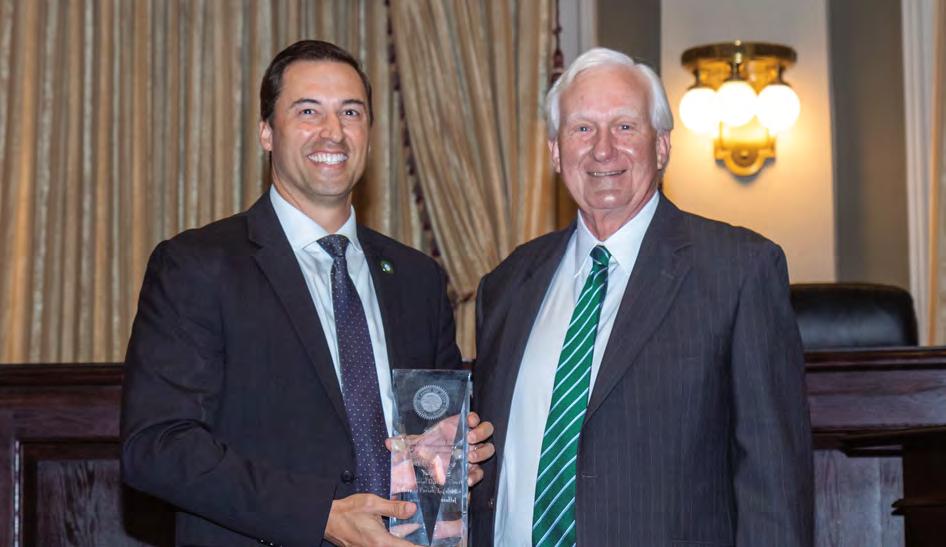
16 NATIONAL CENTER FOR STATE COURTS
Photo courtesy of the Louisiana Supreme Court
(From left) Judge Schlegel receives the William H. Rehnquist Award for Judicial Excellence from Rhode Island Supreme Court Chief Justice Paul Suttell.
WARREN E. BURGER AWARD Excellence in Court Administration
Sally Holewa, state court administrator of North Dakota, is the recipient of NCSC’s Warren E. Burger Award for Excellence in Court Administration. This award recognizes non-judicial court leaders who demonstrate professional expertise, leadership, integrity, creativity, innovativeness, and sound judgment.
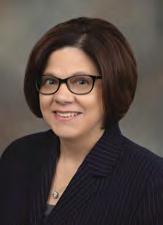
Holewa became North Dakota’s state court administrator in 2005 and has held other leadership positions not only there, but also in Michigan and Minnesota. Her colleagues have recognized her work to develop public trust and confidence in the courts, support access to justice, improve the efficient administration of justice, defend the independence of the courts, and promote the judiciary as a co-equal branch of government.
This award is named after the late Chief Justice Warren Burger, who played a crucial role in the founding of NCSC and the Institute for Court Management.
G. THOMAS MUNSTERMAN AWARD Jury Innovation
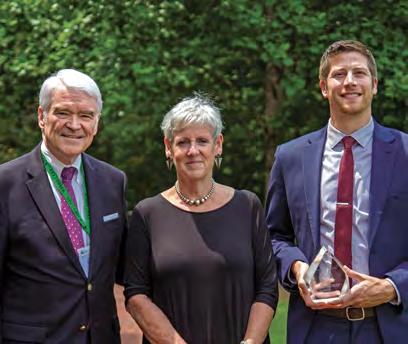
Marilyn Burgess, clerk of the Harris County District Court, Texas, received NCSC’s 2021 G. Thomas Munsterman Award. This award recognizes states, local courts, organizations, and individuals that have made significant improvements or innovations in jury procedures, operations, and practices.
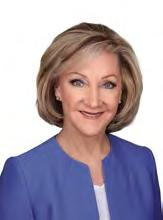
Burgess was elected to her position in 2019 and was recognized for her significant improvements to the court’s jury management system. For example, a new in-house, e-Juror summoning system allows prospective jurors to pre-register online. She also secured funding for juror benefits (such as free parking) and launched the “Stand for Justice” education campaign to promote the importance of juror service.
This award is named for G. Thomas Munsterman, founder and former director of NCSC’s Center for Jury Studies.
SANDRA DAY O’CONNOR AWARD Advancement of Civics Education
The Civic Education Program of the Ohio Supreme Court received the 2021 Sandra Day O’Connor Award, which honors an organization, court, program, or individual who has promoted, inspired, improved, or led an innovation or accomplishment in civics education related to the justice system. The program was recognized for its multifaceted approach that engages both students and adults—and for its ability to adapt to changes caused by the COVID pandemic.
The Civic Education Program uses exhibits at the court’s Visitor Education Center and provides educational lessons and resources aligned with the Ohio Department of Education’s learning standards. When students were required to learn remotely and the supreme court building was closed during the pandemic, the program pivoted to remote curricula and virtual tours of the court.
This was the 11th year NCSC presented the Sandra Day O’Connor Award, which recognizes her tireless work to advance civics education. 2021 also marked the 40th anniversary of Justice O’Connor’s unanimous Senate confirmation to the U.S. Supreme Court.
17 ANNUAL REPORT
(From left) Texas Supreme Court Chief Justice Nathan Hecht presents the Sandra Day O’Connor Award to Ohio Supreme Court Chief Justice Maureen O’Connor and Mason Farr from the court’s civic education office.
Imagining the Courts of Tomorrow
Ask Texas Supreme Court Chief Justice Nathan Hecht why NCSC’s Just Horizons initiative is necessary, and Alice in Wonderland comes to mind.
“Alice in Wonderland asked the Cheshire Cat for directions. ‘I really don’t care where,’ she said, ‘so long as I get somewhere.’ ‘Oh, you’re sure to do that,’ said the Cat, ‘if you only walk long enough.’
“The pandemic has proven at last that the road the justice system has been traveling hints little about the road ahead,” Chief Justice Hecht said. “Remote proceedings are a blockbuster. But there’s more. We finally have fewer preconceptions about which where is the right where, as long as it’s somewhere. We need directions. We can’t simply wander long enough and hope for the best. Just Horizons is about looking forward, about finding those directions. And it’s about identifying key vulnerabilities to pursuing them.”
Chief Justice Hecht is co-chair of NCSC’s Just Horizons initiative, which is exploring the future of courts and how to prepare for it. The effort is led by a council of court leaders and scholars and grounded in strategic foresight, a planning discipline that helps people think rigorously and systematically about the future.
In 2021, Just Horizons released an interim report that identifies 13 drivers of change for the courts — everything from racial justice and inequality to disinformation and cyberthreats.
Cyberthreats have already impacted courts like Texas.

“That’s an issue no judge ever thought about until the last couple years,” he said. “Courts hacked? What are you talking about? Not Texas. But our IT people convinced us the threat was real, so when we had a ransomware attack in May 2020, we were prepared. Well, pretty much. No one is ever fully prepared. But we didn’t pay the ransom, we were back online within a few days, and we lost almost no information.

18 NATIONAL CENTER FOR STATE COURTS
INSPIRING THE FUTURE
Learn more about the Just Horizons initiative ncsc.org/justhorizons
Just Horizons heads into 2022 looking far into the future
NCSC Retrospective of Courthouse Design, Miami-Dade County Civil and Probate Courthouse, Architect of Record: HOK, Washington, DC
“Cyberattacks on the courts aren’t going away. Just Horizons recognizes them as a key vulnerability for courts and asks how best to guard against them.”
The interim report also details scenarios of possible futures in 2032 based on identified drivers of change. The scenarios revolve around circumstances such as distrust in public institutions that divides Americans over socio-political issues and the availability of data to make public services more accessible and efficient.
As it moves into its final phase, the Just Horizons Council is addressing questions surrounding change and its impact: How might each scenario impact what courts do and how they do it? How might each impact how the public views and uses courts? And how might leaders prepare courts for
each scenario?
In his four decades on the bench, Chief Justice Hecht has seen an enormous amount of change. The emphasis on access to justice for all particularly stands out to him.
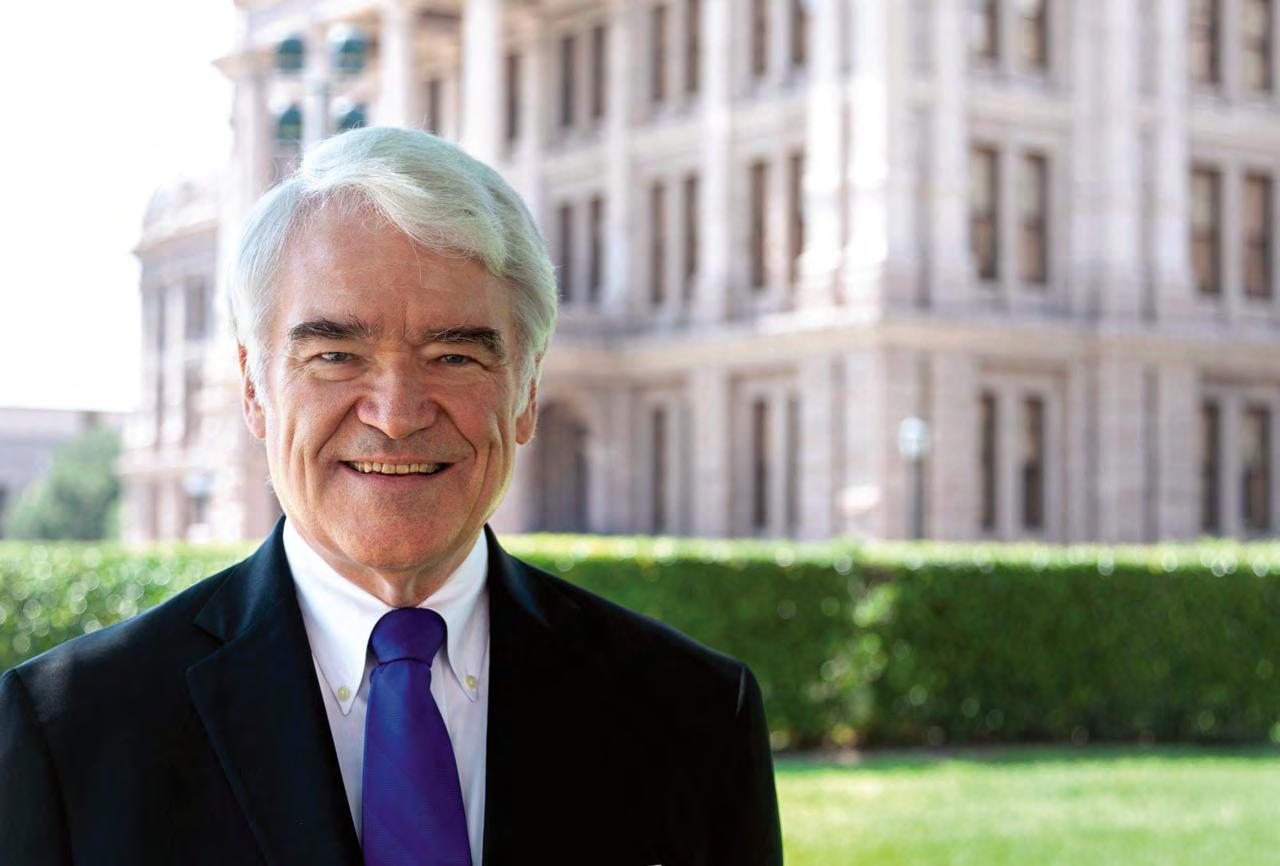
“When I started on the bench, access to justice for the poor was a minor issue,” he said. “There were few pro se litigants. As a civil district judge, if I got one pro se case a month, I wondered why God was mad at me.
“Now, well more than two-thirds of parties in family court cases, and maybe half in other civil cases, try to represent themselves. It’s a sea change. The adversary system, governed by federal-ruleslike procedure, no longer fits the overwhelming majority of cases. Now what? Just Horizons is looking for answers.”
19 ANNUAL REPORT
“THE PANDEMIC HAS PROVEN AT LAST THAT THE ROAD THE JUSTICE SYSTEM HAS BEEN TRAVELING HINTS LITTLE ABOUT THE ROAD AHEAD.”
— CHIEF JUSTICE NATHAN HECHT
Supreme Court of Texas, Co-chair of NCSC Just Horizons initiative
Photo courtesy of the Supreme Court of Texas
Promoting Justice Around the World
New international strategic plan reinforces NCSC’s commitment to the rule of law
Jeff Apperson — who has worked in justice administration for more than four decades, including 25 years overseas — feels like he’s seen everything.
“I’ve seen the threats (to democracies), the swings. It’s cyclical,” said the vice president of NCSC’s International Division. “Whatever we’re seeing now in the world, I’ve seen it before. There’s always a need for assistance in what we do.”
According to Apperson, 2021 was a great time to update the division’s strategic plan, Global Justice Campaign 2022-2026. The plan, he said, calls for expansion into more countries and more closely aligns with the organization’s commitment to the rule of law.
A member of the U.S. Supreme Court Bar who served as an attorney advisor to the Administrative Office of the U.S. Courts for 27 years, Apperson cofounded the International Association for Court Administration, helped establish the International Journal for Court Administration, and is a founding board member of the International Institute for Justice Excellence in The Hague.
He said opportunities to help strengthen judicial systems globally are growing even as democracies face renewed threats from rising authoritarianism and government corruption.
“With this strategic plan, we want the court community to know that we understand the importance of establishing strong democratic institutions globally,” he said. “Judicial branches in emerging democracies need a lot of help, and we want to strengthen them.”
The division will focus on three strategic objectives during its campaign:
1. Promoting democracy and economic stability, ensuring fairness and truth, protecting individual rights, and expanding citizen access to justice by strengthening justice institutions and the rule of law, in partnership with donor organizations.
Learn more about NCSC’s International Division ncscinternational.org

2. Integrating NCSC-developed judicial administration and access to justice best

20 NATIONAL CENTER FOR STATE COURTS
INSPIRING THE FUTURE
practices into international rule of law reform initiatives.
3. Fostering collaborative relationships with international justice sector partners that expand NCSC global engagement and innovation in advancing the rule of law and improving the administration of justice.
The International Division, which worked in about 25 countries in 2021, has offices throughout the world, and looks for opportunities to serve courts in countries that are interested in emulating the U.S. courts model. Apperson often reaches out to judicial leaders in those countries to see how NCSC can help and looks for funding from government agencies and organizations to support those efforts.
Accomplishments in 2021 included:
• Completing a five-year effort to help courts in the northern African nation of Tunisia become more efficient and accessible. The Improving Court Administration in Tunisia Program helped courts by developing a “user information kit” for public education, training
224 court clerks to effectively communicate with citizens and educating more than 1,800 judges, prosecutors and clerks on case and records management. The program also provided research and technical assistance to the newly established High Judicial Council and organized eight model courts to test applications to manage archives, hearings and statistical reports. Eighty-five percent of the 145 courts equipped with the statistical report application adopted it for monthly electronic reporting.
• Producing a report on strengthening Malaysia’s judiciary. The report recommended limiting the head of state’s authority to reject judicial nominations from the judicial appointment commission, building transparency into the judicial nomination process, empowering the commission to advise the head of state when removing judges from office, and establishing an independent judicial removal board.
• Partnering with Central and South America organizations and agencies on various projects. In Colombia, the division worked with the National Association of Drug
Court Professionals to help with the expansion of juvenile drug courts — a continuation of earlier efforts in Bogota and Medellin. NCSC also promoted holistic responses to gender-based violence in Costa Rica in cooperation with the judicial branch, International Association of Women Judges and local health and law enforcement agencies. The two-year program will train judges, prosecutors and law enforcement officers; invest in forensic nursing; and provide services to victims and survivors. Partnering with U.S. embassies, the division supported efforts to improve the administration of justice in Guatemala, Honduras, Costa Rica and Panama. This was an extension of similar work in Latin America that began in 2013.
Apperson continues to be encouraged by the impact of his team’s work and doesn’t let gloomy headlines of democracies teetering on the brink of collapse discourage him.
“We want to be considered not just a program developer but a leader in strengthening the rule of law and justice administration abroad. This strategic plan maps out how we’ll do it,” he said.

21 ANNUAL REPORT
“WE WANT TO BE CONSIDERED NOT JUST A PROGRAM DEVELOPER BUT A LEADER IN STRENGTHENING THE RULE OF LAW AND JUSTICE ADMINISTRATION ABROAD.”
— JEFF APPERSON Vice President, International Programs
WARREN E. BURGER SOCIETY
The National Center for State Courts Warren E. Burger Society honors those who have volunteered their time, talent, and support to the National Center in exceptional ways.
The Burger Society is named for the former Chief Justice of the U.S. Supreme Court who helped found NCSC in 1971. We are proud to recognize the following Society members.
JOHN F. KAY*
JUDITH S. KAYE*
INGO KEILITZ
SUSAN L. KEILITZ
ELISABETH H. KIEL HENRY L. KING*
AUGUSTUS B. KINSOLVING*
ALPHONSE F. LA PORTA MICHAEL H. LANZA HARRY O. LAWSON*
ROBERT A. ARMITAGE
R. B. ATTRIDGE
STEPHEN H. BAKER
S. JACK BALAGIA
ROBERT N. BALDWIN
CURTIS H. BARNETTE
LUTHER J. BATTISTE
DOROTHY T. BEASLEY DAVID J. BECK DANIEL J. BECKER
ROBERT M. BELL
HOWARD H. BERCHTOLD SHEILA L. BIRNBAUM
DAVID BOIES
BOBBE J. BRIDGE
JOHN T. BRODERICK
THOMAS C. BROWN KIM M. BRUNNER
MICHAEL L. BUENGER
DAVID K. BYERS
ELIZABETH J. CABRASER
SHEILA CALABRO
ALAN CARLSON
HARRY L. CARRICO*
LINDA R. CAVINESS
WINSLOW CHRISTIAN*
MICHAEL V. CIRESI
HUGH M. COLLINS
MICHAEL A. COOPER*
THEODORE H. CURRY
JOHN J. CURTIN*
PAUL J. DE MUNIZ
JUDE DEL PREORE
KENNETH T. DERR
RUSSELL C. DEYO
JAN AIKMAN DICKSON
SUE K. DOSAL
RICHARD W. DUESENBERG
HALIBURTON FALES* THEODORE J. FETTER TIMOTHY FLANIGAN
EDITH FOSTER GEORGE S. FRAZZA ROSALYN W. FRIERSON-SMITH
WILLIAM H. GATES*
VERNON M. GEDDY* RONALD M. GEORGE JAMES D. GINGERICH RICHARD C. GODFREY THOMAS A. GOTTSCHALK JOHN M. GREACEN MAURICE R. GREENBERG
JOE R. GREENHILL* ROBERT L. HAIG SOPHIA H. HALL
JIM HANNAH* PATRICIA HANNAH
PAMELA Q. HARRIS MICHAEL G. HEAVICAN HOWELL T. HEFLIN* ANDREW D. HENDRY
JANE A. HESS*
ELIZABETH P. HINES VERNE A. HODGE
LINWOOD HOLTON* R. WILLIAM IDE
JAMES R. JAMES* WALLACE B. JEFFERSON EILEEN A. KATO NICHOLAS D. KATZENBACH*
JACQUELINE M. LEWIS JONATHAN LIPPMAN SIMON M. LORNE L. J. LOVELAND
EDWARD W. MADEIRA*
NANCY MARDER
MARK D. MARTIN
JUDY PERRY MARTINEZ
CHARLES W. MATTHEWS
ROBERT B. MCCAW
MARY E. MCCLYMONT
EDWARD B. MCCONNELL*
ARTHUR A. MCGIVERIN*
VINCENT L. MCKUSICK* MARY C. MCQUEEN DANIEL J. MEADOR* MANUEL A. MEDRANO DONNA M. MELBY E. L. MILONAS W. B. MITCHELL*
THOMAS J. MOYER* EDWARD W. MULLINS BARBARA R. MUNDELL G. T. MUNSTERMAN JANICE T. MUNSTERMAN
GAYLE A. NACHTIGAL
WILLIAM H. NEUKOM CHARLES M. NOTEBOOM
DOROTHY A. O’BRIEN D. DUDLEY OLDHAM THEODORE B. OLSON
DWIGHT D. OPPERMAN* RICHARD DE J. OSBORNE BETTY W. OSBORNE
LOUISE M. PARENT GEORGE T. PATTON WILLIAM G. PAUL ROBERT S. PECK
22 NATIONAL CENTER FOR STATE COURTS
CHARLES H. PELTON
ANDREW M. PERLMAN
ELLEN A. PETERS
THOMAS R. PHILLIPS
JOHN H. PICKERING*
PEGGY A. QUINCE
LYLE REID
WILLIAM S. RICHARDSON*
SALLY M. RIDER
WILLIAM L. ROBERTS
F.J. ROBINSON
JOAN ROBINSON
WM. T. “BILL” ROBINSON*
JOHN H. ROCKWELL*
KALISTE J. SALOOM*
KARL J. SANDSTROM
CHARLES R. SCHADER
JOHN G. SCRIVEN
RANDALL T. SHEPARD
DALE SIPES*
LARRY L. SIPES
CHESTERFIELD SMITH*
TODD A. SMITH
ARTHUR H. SNOWDEN
MYRON T. STEELE
ROBERT F. STEPHENS* GEORGE A. STINSON* DANIEL H. STRAUB* RONALD J. STUPAK*
KATHERINE STUPAK STEPHEN D. SUSMAN* ROBERT B. TAYLOR SANDRA A. THOMPSON* JEAN H. TOAL GERALD W. VANDEWALLE E. NORMAN VEASEY WILLIAM C. VICKREY
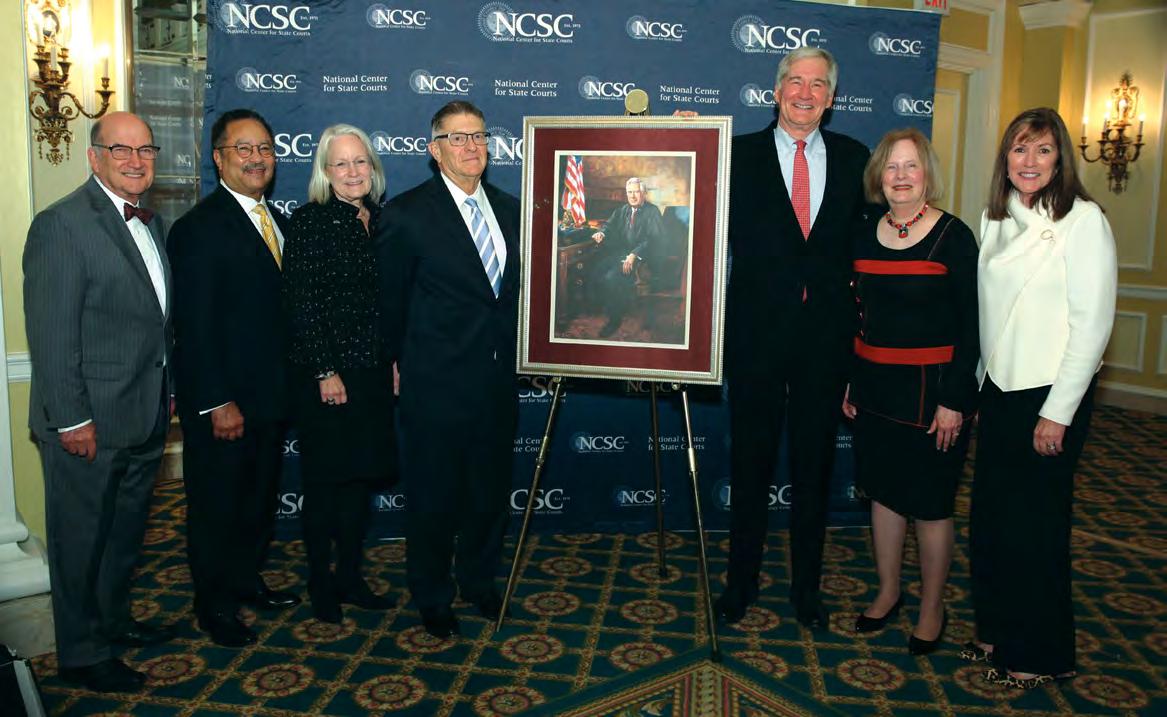
SYLVIA H. WALBOLT ROGER K. WARREN
WILLIAM K. WEISENBERG BRENDA A. WILLIAMS
W. WAYNE WITHERS* ROBERT A. ZASTANY
GUY A. ZOGHBY* *Deceased
NCSC WELCOMED THE FOLLOWING MEMBERS INTO THE BURGER SOCIETY IN 2021
LUTHER J. BATTISTE, III Founding Shareholder of Johnson, Toal & Battiste Columbia, SC
RUSSELL C. DEYO
Vice President and General Counsel at Johnson & Johnson (Retired)
PAMELA Q. HARRIS
Maryland State Court Administrator MICHAEL G. HEAVICAN Nebraska Supreme Court Chief Justice
ELIZABETH P. “LIBBY” HINES Judge from 15th District Court in Ann Arbor, MI (Retired)
SIMON M. “SY” LORNE Vice Chairman and Chief Legal Officer for Millennium Management New York, NY
JUDY PERRY MARTINEZ
Of Counsel at Simon, Peragine, Smith & Redfearn New Orleans, LA
GENERAL COUNSEL COMMITTEE
The General Counsel Committee of the National Center for State Courts facilitates the intellectual collaboration between the general counsel of America’s leading corporations and National Center experts on judicial issues that affect the public, the business community, and state court leaders
CHAIRS
RANDALL M. EBNER
Former Vice President & General Counsel
ExxonMobil Corporation
MICHAEL J. HARRINGTON
Former Senior Vice President & General Counsel Eli Lilly and Company

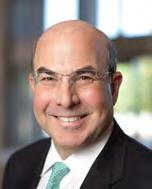
MEMBERS
ROBERT A. ARMITAGE
Eli Lilly and Company (Retired)
JOHN W. ATTEY
Senior Vice President and Chief Legal Officer Cambia Health Solutions
S. JACK BALAGIA
ExxonMobil Corporation (Retired)
MARTIN R. BAKER
Senior Vice President, General Counsel & Chief Compliance Officer The Greenbrier Companies
STEVEN P. CROLEY
Chief Policy Officer and General Counsel Ford Motor Company
RUSSELL C. DEYO
Johnson & Johnson (Retired)
MICHAEL FREEDMAN
General Counsel Freedom Financial Network
CRAIG B. GLIDDEN
Executive Vice President & General Counsel General Motors
ANDREW D. HENDRY
Colgate-Palmolive Company (Retired)
MICHAEL J. HOLSTON
Senior Vice President, General Counsel & Chief Compliance Officer General Electric Company
MARK S. HOWARD
Executive Vice President and Chief Legal Officer Nationwide Mutual Insurance Company
DAMON HART
Executive Vice President & Chief Legal Officer Liberty Mutual Group
R. WILLIAM IDE
Monsanto Company (Retired)
FRANK R. JIMENEZ
General Counsel Raytheon Technologies
MICHAEL H. LANZA
Executive Vice President & General Counsel & Chief Compliance Officer Selective Insurance Company of America
THOMAS C. LEIGHTON
Vice President, Government Relations & Content Acquisitions Thomson Reuters
DEBORAH P. MAJORAS
Chief Legal Officer & Secretary Procter & Gamble Company
CHARLES W. MATTHEWS
ExxonMobil Corporation (Retired)
DAVID R. MCATEE
Senior Executive Vice President and General Counsel AT&T Inc.
STEPHEN MCMANUS
Senior Vice President and General Counsel State Farm Mutual Automobile Insurance Company
JEFFREY MERIGGI
Chief Business Affairs & Legal Officer Pretium
LAUREN MOGENSEN
Global General Counsel Bank of America Corporation
CRAIG S. MORFORD
Vice President & General Counsel ExxonMobil Corporation
R. HEWITT PATE
Vice President & General Counsel Chevron Corporation
KEVIN RHODES
Senior Vice President, Legal Affairs & General Counsel 3M Company
SANDRA PHILLIPS ROGERS
Group Vice President, Chief Legal Officer, General Counsel and Corporate Secretary Toyota Motor North America
MICHAEL H. ULLMANN
Executive Vice President & General Counsel Johnson & Johnson
JEANNE E. WALKER
Senior Counsel, Business Adviser to General Counsel, Global Litigation Shell Oil Company
AMY WILSON
General Counsel and Corporate Secretary Dow Chemical Company
JENNIFER L. ZACHARY
Executive Vice President, General Counsel & Corporate Secretary MERCK & CO., INC.
24 NATIONAL CENTER FOR STATE COURTS
Randall M. Ebner
Michael J. Harrington
PROJECT FUNDING
We are grateful for the many foundations, organizations, and government agencies that support our project work in the state courts and courts around the world.
OTHER
AMERICAN ACADEMY OF ADDICTION PSYCHIATRY (AAAP)
AMERICAN BOARD OF TRIAL ADVOCATES (ABOTA)
AMERICAN JUDGES ASSOCIATION ASIAN PACIFIC INSTITUTE
CENTER FOR CHILDREN AND FAMILY FUTURES, INC.
CENTER FOR EFFECTIVE PUBLIC POLICY
DAI GLOBAL
FOUNDATIONS
ANNIE E. CASEY FOUNDATION
ARNOLD VENTURES
BANK OF AMERICA CHARITABLE FOUNDATION
CASEY FAMILY PROGRAMS
FOUNDATION FOR ADVANCING ALCOHOL RESPONSIBILITY (FAAR)
JOHN D. AND CATHERINE T. MACARTHUR FOUNDATION
JPB FOUNDATION
LAURA AND JOHN ARNOLD FOUNDATION
MELVILLE CHARITABLE TRUST MENTAL HEALTH COLORADO
OHIO STATE BAR FOUNDATION
OPEN SOCIETY FOUNDATION
THE ASIA FOUNDATION
THE PEW CHARITABLE TRUSTS WELLS FARGO FOUNDATION
GOVERNMENT
U.S. DEPARTMENT OF JUSTICE, OFFICE OF JUSTICE PROGRAMS
NATIONAL INSTITUTE OF JUSTICE OFFICE FOR VICTIMS OF CRIME OFFICE ON VIOLENCE AGAINST WOMEN
U.S. DEPARTMENT OF TRANSPORTATION
FEDERAL MOTOR CARRIER SAFETY ADMINISTRATION
COMMERICIAL DRIVER’S LICENSE PROGRAM IMPROVEMENT
STATE JUSTICE INSTITUTE
U.S. AGENCY FOR INTERNATIONAL DEVELOPMENT
U.S. DEPARTMENT OF STATE
BUREAU OF INTERNATIONAL NARCOTICS AND LAW ENFORCEMENT AFFAIRS
BUREAU OF NEAR EAST AFFAIRS
BUREAU OF DEMOCRACY, HUMAN RIGHTS, AND LABOR
BUREAU OF COUNTERTERRORISM
ADMINISTRATIVE OFFICE OF THE UNITED STATES COURTS NATIONAL SCIENCE FOUNDATION
EXECUTIVE OFFICE OF IMMIGRATION REVIEW
INSTITUTE FOR INTERGOVERNMENTAL RESEARCH (IIR)
INTERNATIONAL LEGAL ASSISTANCE CONSORTIUM (ILAC)
NATIONAL ASSOCIATION FOR COURT MANAGEMENT
NATIONAL ASSOCIATION OF CRIMINAL DEFENSE LAWYERS
NATIONAL ASSOCIATION OF DRUG COURT PROFESSIONALS
NATIONAL CONGRESS OF AMERICAN INDIANS
NATIONAL DISTRICT ATTORNEYS ASSOCIATION (NDAA)
NIGERIA NATIONAL JUDICIAL COUNCIL PAE PROFESSIONAL SERVICES
PRETIUM
RTI INTERNATIONAL SEARCH, THE NATIONAL CONSORTIUM FOR JUSTICE INFORMATION AND STATISTICS
THE COUNCIL OF STATE GOVERNMENTS LTD.
THE RAND CORPORATION
THE URBAN INSTITUTE
UNITED NATIONS DEVELOPMENT PROGRAMME
NCSC FINANCIAL INFORMATION
Visit ncsc.org for NCSC financial information and past annual reports.
25 ANNUAL REPORT
LAWYERS COMMITTEE
As officers of the court, lawyers have a special commitment to help improve the performance of the state courts for the benefit of their clients and the public. Membership on NCSC Lawyers Committee furthers this goal. Our members actively engage with the Chief Justices and other court leaders on a range of issues affecting the courts.
CHAIRS
ELENA R. BACA
Paul Hastings
PATRICK MALONE
Patrick Malone & Associates
MEMBERSHIP CHAIR
ROBERT E. MALONEY JR. Lane Powell
MEMBERS
PAUL ALSTON Dentons
D. LEON ASHFORD Hare Wynn Newell & Newton
CURTIS H. BARNETTE Skadden (Retired)
PAUL A. BARRETT Barrett & Gilman
HUNTER M. BARROW Andrews Myers
DAVID J. BECK Beck Redden
P. RYAN BECKETT Butler Snow
MARK A. BEHRENS
Shook Hardy & Bacon
SHEILA L. BIRNBAUM Dechert
DAVID BLEDSOE
Perkins Coie
BILL BLOSS
Koskoff Koskoff & Bieder
C. MITCHELL BROWN Nelson Mullins
DAVID L. BROWN Hansen McClintock & Riley
ELIZABETH J. CABRASER Lieff Cabraser Heimann & Bernstein
JAMES M. CAMPBELL Campbell Conroy & O’Neil
COLIN F. CAMPBELL Osborn Maledon
DAVID E. CHRISTENSEN Christensen Law
MICHAEL V. CIRESI Ciresi Conlin
W. THOMPSON COMERFORD Comerford & Britt
MARK A. CUNNINGHAM Jones Walker
BARTHOLOMEW J. DALTON Dalton & Associates
CHRISTINA U. DOUGLAS Womble Bond Dickinson
MELODY H. EAGAN Lightfoot Franklin & White
LEWIS S.”MIKE” EIDSON Colson Hicks & Eidson
BRUCE W. FELMLY McLane Middleton
PETER J. FLOWERS Meyers & Flowers
RICHARDS H. FORD Wicker Smith
RICHARD C. GODFREY Kirkland & Ellis
STEPHEN E. GOLDMAN Robinson & Cole
THOMAS A. GOTTSCHALK Kirkland & Ellis
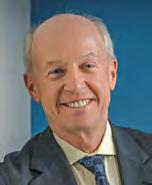
MAURICE B. GRAHAM Gray Ritter & Graham
NINA M. GUSSACK Pepper Hamilton
ROBERT L. HAIG Kelley Drye & Warren
KAREN G. JOHNSON-MCKEWAN Orrick Herrington & Sutcliffe
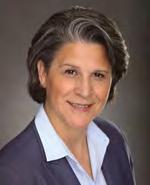
MICHAEL A. KELLY Walkup Melodia Kelly & Schoenberger
MICHAEL F. KINNEY Cassem Tierney Adams Gotch & Douglas
JAMES K. LEADER Leader & Berkon
RICHARD H. LEVENSTEIN Nason Yeager Gerson Harris & Fumero
MICHAEL P. MAGUIRE Michael Maguire & Associates
ROBERT E. MALONEY Lane Powell
MARK S. MANDELL Mandell Schwartz & Boisclair
26 NATIONAL CENTER FOR STATE COURTS
Elena R. BacaPatrick Malone
JOSEPH R. MARCONI Johnson & Bell
JAMES C. MARTIN Reed Smith
WAYNE B. MASON Drinker Biddle & Reath
DARIN P. MCATEE Cravath, Swaine & Moore
KARA L. MCCALL Sidley Austin
LETITIA A. MCDONALD King & Spalding
DONNA M. MELBY Paul Hastings
DREW MIROFF Ice Miller
MONICA T. MONDAY Gentry Locke
BRIDGET MOORE Baker Botts
DAVID R. MORANTZ Shamberg Johnson & Bergman
MICHAEL J. MUELLER Hunton Andrews Kurth
GARY P. NAFTALIS Kramer Levin Naftalis & Frankel
CHARLES M. NOTEBOOM Noteboom - The Law Firm
ARAMEH Z. O’BOYLE Mintz
THOMAS C. O’BRIEN Miller Canfield Paddock & Stone
TERENCE O’TOOLE Starn O’Toole Marcus & Fisher
THEODORE B. OLSON Gibson Dunn & Crutcher
RONALD L. OLSON Munger Tolles & Olson
JENNIFER L. PARENT McLane Middleton
ROBERT S. PECK Center for Constitutional Litigation
YOUNG LAWYERS COMMITTEE
Lawyers Committee members are encouraged to mentor and name a young attorney to serve on the Young Lawyers Committee State court leaders value the unique perspective and ideas that these members provide in advisory groups and annual meetings. The Committee’s goal is to engage young lawyers in the substantive work of NCSC while also fostering deeper relationships through networking with other members of the bench and bar.
CHAIRS
MICAH J. FINCHER Jones Walker
BRANDON HECHTMAN Wicker Smith
MEMBERS
A. MATTISON BOGAN Nelson Mullins
MOLLY Q. CAMPBELL Reed Smith
YVONNE W. CHAN Goodwin Procter
HEATHER S. CHOI Baker Botts
CAROLINE B. GIORDANO Miller Canfield Paddock and Stone
JACOB M. HEATH Orrick Herrington & Sutcliffe
STEVEN A. LOPEZ Gibbs Law Group
ZACHARY M. MANDELL Mandell Schwartz & Boisclair
EMILY MILLER Andrews Myers
MATTHEW PIERCE Gordon Tilden Thomas Cordell
DANIEL PRINCE Paul Hastings
ALEX B. ROBERTS Beck Redden
MONICA C. SEGURA Rumberger Kirk & Caldwell
SARAH MOTLEY STONE Womble Bond Dickinson
KATHLEEN F. PETERSON Ciresi Conlin
JOHN T. PRISBE Venable
F. J. “JIM” ROBINSON, JR. Hite Fanning & Honeyman
JOSEPH F. SAVAGE Goodwin Procter
WILLIAM SAVITT Wachtell Lipton Rosen & Katz
CHRISTIAN D. SEARCY Searcy Denney Scarola Barnhart & Shipley
TODD A. SMITH Smith LaCien
MICHAEL W. SMITH Christian & Barton
MYRON T. STEELE Potter Anderson & Corroon
DAVID S. STEUER Wilson Sonsini Goodrich & Rosati
SAMUEL L. TARRY McGuireWoods
JEFFREY I. TILDEN Gordon Tilden Thomas Cordell
MARK TRACHTENBERG Haynes and Boone
DAN K. WORTHINGTON Ramon Worthington
27 ANNUAL REPORT
2021 HONOR ROLL OF CONTRIBUTORS
The National Center for State Courts is pleased to express our deep appreciation for the generosity of these corporations and law firms.
FAEGRE DRINKER BIDDLE & REATH
GOODWIN PROCTER
GORDON TILDEN THOMAS CORDELL
GRAY RITTER & GRAHAM
HANSEN MCCLINTOCK & RILEY
HARE WYNN NEWELL & NEWTON
HITE FANNING & HONEYMAN
ICE MILLER
JOHNSON & BELL
CORPORATE CONTRIBUTORS
Gifts of $25,000+
BANK OF AMERICA CORPORATION
EXXONMOBIL CORPORATION
FREEDOM FINANCIAL NETWORK
PRETIUM
WELLS FARGO FOUNDATION
Gifts of $10,000 - $24,999
3M COMPANY
AT&T
CAMBIA HEALTH SOLUTIONS
CHEVRON CORPORATION
FORD MOTOR COMPANY
GENERAL ELECTRIC COMPANY
GENERAL MOTORS COMPANY
JOHNSON & JOHNSON
LIBERTY MUTUAL INSURANCE COMPANIES
MERCK & COMPANY
NATIONWIDE MUTUAL INSURANCE COMPANY
RAYTHEON TECHNOLOGIES
SELECTIVE INSURANCE GROUP
SHELL OIL COMPANY
STATE FARM INSURANCE COMPANIES
THOMSON REUTERS CORPORATION
TOYOTA MOTOR NORTH AMERICA
Gifts up to $10,000
PROCTER & GAMBLE COMPANY
LAW FIRM CONTRIBUTORS
JUSTICE CIRCLE
Gifts of $5,000 - $9,999
BECK REDDEN CIRESI CONLIN
CRAVATH SWAINE & MOORE GENTRY LOCKE
LIEFF, CABRASER, HEIMANN & BERNSTEIN
MEYERS & FLOWERS
MUNGER TOLLES & OLSON
NASON YEAGER GERSON HARRIS & FUMERO
NELSON MULLINS
PAUL HASTINGS
REED SMITH
SEARCY DENNEY SCAROLA BARNHART & SHIPLEY
SMITH LACIEN
WACHTELL LIPTON ROSEN & KATZ
WALKUP MELODIA KELLY & SCHOENBERGER WILSON SONSINI GOODRICH & ROSATI
AMICUS CIRCLE
Gifts of $3,000 - $4,999 ANDREWS MYERS
BUTLER SNOW
CASSEM TIERNEY ADAMS GOTCH & DOUGLAS
CHRISTENSEN LAW DALTON & ASSOCIATES DECHERT DENTONS
JOAN K. COCHET MEMORIAL SCHOLARSHIP
JONES WALKER
KIRKLAND & ELLIS
KOSKOFF KOSKOFF & BIEDER
KRAMER LEVIN NAFTALIS & FRANKEL
LANE POWELL
LEADER BERKON COLAO & SILVERSTEIN
LIGHTFOOT FRANKLIN & WHITE
MCGUIREWOODS
MICHAEL MAGUIRE & ASSOCIATES
MILLER CANFIELD PADDOCK & STONE
MINTZ LEVIN COHN FERRIS GLOVSKY & POPEO
ORRICK HERRINGTON & SUTCLIFFE
OSBORN & MALEDON
PATRICK MALONE & ASSOCIATES
PERKINS COIE
POTTER ANDERSON & CORROON
RAMON WORTHINGTON
ROBINSON & COLE
SHAMBERG JOHNSON & BERGMAN
SHOOK HARDY & BACON
STARNE O’TOOLE MARCUS & FISHER VENABLE WOMBLE BOND DICKINSON
Gifts up to $3,000
BARRETT & GILMAN
CENTER FOR CONSTITUTIONAL LITIGATION
CHRISTIAN & BARTON
KELLEY DRYE & WARREN MCLANE MIDDLETON
The National Center for State Courts recognizes the following individuals who made a gift to the Joan K. Cochet Memorial Scholarship for the Institute for Court Management (ICM). The scholarship helps deserving students achieve the status of ICM Fellow — the highest level of ICM’s certification program.
TRIBUTE GIFTS
The National Center for State Courts gratefully acknowledges the following honor and memorial gifts received in 2021.
IN HONOR OF ROBERT N. BALDWIN Paul L. Reiber Michael Riggs
DAVID BYERS Paul Julien
HON. SUE BELL COBB (Alabama) Callie T. Dietz
IN MEMORY OF
HON. SHIRLEY S. ABRAHAMSON (Wisconsin) Zygmont A. Pines
HON. MARK S. CADY (Iowa) Loretta H. Rush
JOAN K. COCHET Jesse Rutledge
DONALD M. DIETZ Callie T. Dietz
MAURICE D. GEIGER Richard B. Hoffman
E. HANK HEIDT Amber L. Britton
THEODORE E HERRERA Anonymous
JAMES A HUEHOLT Barbara Holmes
B. LOIS HUEHOLT Barbara Holmes
HON. JUDITH KAYE (New York) Zygmont A. Pines
EDWARD KRITZMAN Fritz Ohlrich
HON. BARRY G. LOGSDON (Virginia) Julia Edwards-McDaniel
HON. RICHARD MARKUS (Ohio) William K. Weisenberg
RANDALL MELBY Donna M. Melby
HON. WILLIAM S. RICHARDSON (Hawaii) Hawaii Judiciary
WILLIAM T. ROBINSON, III Konstantina Vagenas
HON. ARTHUR J. SIMPSON (New Jersey) Dorothy T. Beasley
LOUISE SONET Patricia Evans
DANIEL E. STRAUB Margaret R. Allen Anonymous Ada Lau Johnny Tse
JAN STROMSEN Marta E. Hernandez
RONALD J. STUPAK Katherine Stupak
HON. STEPHEN TOTH (New Jersey) Dorothy T. Beasley
NICHOLAOS VASILIOS VAGENAS Konstantina Vagenas
KATHERINE T. WILKE Michael A. Zamperini Thomas Z. Wilke
HON. MARY E. FAIRHURST (Washington)* Callie T. Dietz
HERBERT FISHER Konstantina Vagenas
ERNEST C. FRIESEN John R. Meeks
J.D. GINGERICH Diane Robinson
ANTOINETTE GRAINER Gregory Orme DANIELLE HIRSCH Joan Gomberg
ICM CLASS OF 2007 Sally A. Holewa
HON. STEPHEN P. LINEBAUGH (Pennsylvania) Jennifer Menges
HON. BARBARA MADSEN (Washington) Callie T. Dietz
MARY C. MCQUEEN Luther J. Battiste Alan Johnson
G. THOMAS MUNSTERMAN Paula Hannaford Agor
DANIEL R. SOSA, JR.* Jan Burton
*Deceased
HOWARD H. BERCHTOLD
JAN BURTON
JANET G. CORNELL
JUDE DEL PREORE
PATRICIA EVANS
SALLY A. HOLEWA
KELLY HUTTON
JOY KELLER
MARISSA MCDERMOTT AMY M. MCDOWELL
JOHN R. MEEKS
GREGORY E. MIZE
DIANE PATTAVINA
LINDA R. SOLES BRENDA M. TAYLOR ROBERT D. WESSELS
Gifts of $5,000 or more
ELENA R. BACA
BARRY P. BARBASH
CUMMINS-LEVENSTEIN CHARITABLE FOUNDATION
DEYO FAMILY CHARITABLE FUND
RANDALL M. EBNER
JUDY AND MICHAEL HARRINGTON FAMILY FOUNDATION
ANDREW D. HENDRY
SIMON M. LORNE
THOMAS W. ROSS
PATRICIA A. STANLEY
Gifts of $2,500 – $4,999
CURTIS H. BARNETTE
REGINALD J. BROWN
RICHARD C. GODFREY
SOPHIA H. HALL
LYNN R. JOHNSON
DONNA M. MELBY
ELIZABETH N. MULVEY
Gifts of $1,000 – $2,499
RONALD B. ADRINE
JEFF A. APPERSON
ROBERT A. ARMITAGE
STEPHEN H. BAKER
ROBERT N. BALDWIN
LUTHER J. BATTISTE, III
DOROTHY T. BEASLEY
BLAND FAMILY CHARITABLE FUND
MICHAEL L. BUENGER
LINDA & TIM CAVINESS
STEPHEN G. CRANE
ALICIA DAVIS
CALLIE T. DIETZ
JIMMIE M. EDWARDS
GORDON M. GRILLER
PAULA HANNAFORD AGOR
The Friends of the Court program recognizes recognizes individuals, organizations and companies that have made a personal financial contribution in support of NCSC’s work and programs. These contributions enable NCSC to provide quality training and education, independent research, and to promote awareness of issues surrounding the administration of justice. The National Center gratefully acknowledges the following supporters who made a gift in 2021.
ROBERT L. HAIG
PAMELA Q. HARRIS
MICHAEL G. HEAVICAN
ELIZABETH P. HINES
R. WILLIAM IDE, III INGO & SUSAN KEILITZ
MICHAEL H. LANZA MICHAEL P. MAGUIRE
JAMES C. MARTIN
CHARLES W. MATTHEWS, JR. MELANIE G. MAY MARY C. MCQUEEN
DAN MOZENA
CHARLES H. PELTON KATHLEEN F. PETERSON
PEGGY A. QUINCE
JESSE RUTLEDGE
COLLINS J. SEITZ, JR. KATHERINE STUPAK ROBERT D. WESSELS
Gifts of $500 – $999
JENNIFER D. BAILEY
HOWARD H. BERCHTOLD, JR. RUSSELL R. BROWN, III
PAMELA CASEY
COUNCIL OF CHIEF JUDGES OF STATE COURTS OF APPEAL
BRENT E. & JAN AIKMAN DICKSON
LAURIE K. DUDGEON
DAVID E. GILBERTSON
THOMAS A. GOTTSCHALK
JOHN M. GREACEN
NATHAN L. HECHT
SALLY A. HOLEWA
ALAN JOHNSON
MARK D. MARTIN
JUDY PERRY MARTINEZ
JOHN R. MEEKS
JOHN D. AND SUSAN MINTON
MARLA S. MOORE
EDWARD W. MULLINS, JR. TOM & JANICE MUNSTERMAN
THE NATIONAL ASSOCIATION OF STATE JUDICIAL EDUCATORS
THE NATIONAL JUDICIAL COLLEGE
LUDMILA PERESVETOVA
PAUL L. REIBER
CHARLES R. SCHADER RICHARD SCHWERMER
TOKO SERITA
RANDALL T. SHEPARD
LARRY L. SIPES
PAUL A. SUTTELL
TENNESSEE ADMINISTRATIVE OFFICE OF THE COURTS
LARRY D. THOMPSON ROGER K. WARREN THOMAS Z. WILKE
Gifts of $250 – $499 JEROME B. ABRAMS STEVE BADGER K. KENT BATTY MERCEDES M. BAUERMEISTER TRACY J. BEMENT TARA BLAIR

DAVID & NANCY BOYD
SHEILA CALABRO
RONALD D. CASTILLE
CONFERENCE OF COURT PUBLIC INFORMATION OFFICERS
J. PETER COOLSEN
JANET G. CORNELL
WILLIAM H. EDINGTON
JULIA EDWARDS-MCDANIEL
KEITH GOEHRING
KARL R. HADE DANIEL J. HALL
JAMES M. HARRIS
HAWAII JUDICIARY
STEPHANIE E. HESS
TIMOTHY M. HUGHES
SATOSHI & CAROLYN ITO
EILEEN A. KATO
JOY KELLER
TONNYA K. KOHN
GARY W. LYNCH
BARRY MAHONEY
JAMES F. MCHUGH
STEPHEN MCMANUS
JENNIFER MENGES
NORMAN H. MEYER, JR.
GREGORY E. MIZE
MAUREEN O’CONNOR
FRITZ OHLRICH
ROBERT S. PECK
STEPHEN W. POWELL
MARK E. RECKTENWALD
MARCUS & ANITA
REINKENSMEYER
LORETTA H. RUSH
ROBIN SAGE
DENNIS J. SMITH
SUZANNE H. STINSON
NORA E. SYDOW
SAMUEL L. TARRY
ROBERT J. TORRES, JR. GWEN M. WHITAKER
ERICA R. YEW
Gifts of $100 – $249

DIMARIE ALICEA-LOZADA
MARGARET R. ALLEN
DAVID BARTEE
DOUGLAS R. BEACH
EDWIN T. BELL
PAUL P. BIEBEL
ANNA BLACKBURNE-RIGSBY
EPHANIE A. BLAIR
AMBER L. BRITTON
EDWARD & LINDA BRUNNER
30 NATIONAL CENTER FOR STATE COURTS
LEONORA BURGER
CAMERON S. BURKE
PAUL J. BURKE
JAN BURTON
PAMELA BURTON
CHARLES F. CAMPBELL
ALAN CARLSON
WILLIAM C. CARPENTER, JR.
PATRICIA A. CHAUVIN
FRED CHEESMAN
IDA K. CHEN
SARAH T. CLARK
EDWARD C. CLIFTON
RICHARD R. CLIFTON
HUGH M. COLLINS
JOHN COLLINS
JOHN E. CONERY
HILDA CUTHBERTSON
KATHERINE A. DABNEY
JUDE DEL PREORE
MARK DI VINCENZO
SHARI DIAMOND
SUSANNE DIPIETRO
SUE K. DOSAL
LEONARD P. EDWARDS
MICHAEL D. FISHER
ROSALYN W. FRIERSON-SMITH
KEM T. FROST
VALERIE F. GARDNER
RONALD M. GEORGE
JOAN GOMBERG
LYDIA HAMBLIN
ROBERT HARRELL
DAVID J. HAYWARD
KRISTIAN HEDINE
MARY E. HENRY
MARTA E. HERNANDEZ
RICHARD HOBSON
RICHARD B. HOFFMAN
ROB HOFMANN
MARY T. HOGAN
BARBARA HOLMES
L. M. JACOBS, IV
PAUL JULIEN
HAROLD KAHN
MELINDA KANTOR
ELIZABETH KEEVER
WILLIAM G. KELLY
LAURA G. KLAVERSMA
DALE R. KOCH
JACK KOMAR
MILTON L. MACK, JR.
DEBORAH A. MASON
MARISSA MCDERMOTT
AMY M. MCDOWELL
JAMES A. MCMILLAN
LORRI W. MONTGOMERY
BARBARA R. MUNDELL
DAMIAN G. MURRAY
JOHN T. NOCKLEBY
TODD NUCCIO
D. DUDLEY OLDHAM
GREGORY ORME
BRIAN J. OSTROM
ZYGMONT A. PINES
DENNIS RABIDOU
STUART RABNER
JANET REID
JUDITH RESNIK
MICHAEL RIGGS
DIANE ROBINSON
KEITH E. ROBINSON
W. TERRY RUCKRIEGLE
GREGORY L. SATTIZAHN
THOMAS E. SCHULZ
PREM SHARMA
JEFF SHORBA
PATRICK G. SHUBIRD
NANCY M. SILLERY
ALAN SLATER
DAVID W. SLAYTON
STACEY A. SMITH
LINDA R. SOLES
CHARLOTTE K. SUGG
DAVID SUNTAG

MARCI TAETS
SUSAN K. TALLERICO
ALAN J. TOMKINS
GEORGIA VAGENAS
KONSTANTINA VAGENAS
LISA VAN AMBURG
NAN G. WALLER
NICOLE WATERS
MARK A. WEINBERG
WILLIAM K. WEISENBERG
CINDI L. WELDY
MARK J. WENGER
ROGER L. WOLLMAN
JAMES T. WORTHEN
CHRISTOPHER WU
MICHAEL ZAMPERINI
ZACH ZARNOW
Gifts up to $99
PAUL ALESSANDRONI
DAVID ANDERSON
PAUL A. BACIGALUPO
ELIZABETH BARNHART TERESA A. BEAUDET DANIEL J. BECKER
JOANN BENNETT
MARK & HEATHER BINGHAM KEVIN S. BURKE
SHAY CLEARY
AMY M. DAVENPORT
ALEXANDRA D. DIPENTIMA
JOHN DOUGLAS
LAVOLIA E. DUNCAN
PATRICIA ESCOBAR
PATRICIA EVANS
SUSAN FORMAKER
DONOVAN FOUGHTY STEPHEN GOLDSPIEL
JENNIFER L. HAIRE BREANNE HARRIS
KELLY HUTTON CHRISTINE J. IVERSON MOLLY JUSTICE LOIS KAWAJIRI KIMBERLY KIERCE
ADA LAU
HUNG LY
COLETTE
MCCURDY-JACKSON
ROBERT MEAD
MICHAEL NEUREN
RICHARD NEWMAN
DIANE PATTAVINA
MATTHEW PENDY CAROLYN PROBST NIAL RAAEN
SHANNON ROTH
DAVID B. ROTTMAN
RALPH TIMOTHY RUSSELL
MANDY SARKISSIAN
THOMAS SCHEUERMANN
DAVID C. STEELMAN
SHAUNA M. STRICKLAND
DAGNACHEW SULAMO DENNIS M. SWEENEY
BRENDA M. TAYLOR
FRANCIE TEER
JOHNNY TSE PATRICIA WARD BRENDA A. WILLIAMS CHANG-MING YEH MONIA ZGARNI
Every effort has been made to list current and accurate information. If you see an error or omission, we would like to hear from you at development@ncsc.org.
The National Center for State Courts established the Presidents Legacy Society in honor of its four presidents — Edward B. McConnell, Larry L. Sipes, Roger K. Warren, and Mary C. McQueen — to honor and celebrate donors who provide legacy gifts to help NCSC to fulfill its mission of promoting the rule of law and improving the administration of justice in state courts and courts around the world.

Williamsburg, Virginia, Headquarters Arlington, Virginia Denver, Colorado Washington, DC ncsc.org FIFTY YEARS OF TRUSTED LEADERSHIP. PROVEN SOLUTIONS. BETTER COURTS. 1971 – 2021 Published March 2022 © 2022 National Center for State Courts



























































